The Best PC Games Of 2023

You know the drill by now–it’s December and that means GameSpot is talking about all the games we most enjoyed from this past year. The following gallery includes what we, as a publication, agree to be the best PC games of 2023, which includes GameSpot’s game of the year: Baldur’s Gate 3.
Now I know what you’re thinking: Aren’t a lot of games on PC available on at least one console as well? And yeah, that’s true, so we have to lay out some ground rules. All of the games that made our list of best PC games are either exclusive to PC or are meaningfully improved in some way by playing them on PC. Baldur’s Gate 3, for example, is available for PS5 and Xbox Series X|S as well, but the game best controls on PC.
With that out of the way, read on for a look at the year’s best PC games, and be sure to also check out our overall top 10 games of the year.
Alan Wake II

Remedy’s journey into the survival-horror genre pays off in spades with Alan Wake 2, which not only tells an excellent story full of meta layers and stellar performances, but also manages to stand among the genre’s best. It creates and maintains an unnerving atmosphere from beginning to end, while also integrating fascinating uses of live action and music, which come together for a stunning sequence that is cherry on top of an unforgettable experience.
Although it is also available on console, Alan Wake 2 shines on PC. Horror benefits from the intimate nature of PC gaming, amplifying the tension throughout–being close to your monitor also makes Alan’s unsettling Game Over screen all the more impactful.
But more than that, Remedy takes full advantage of high-end PC hardware. Provided your computer is up to it, the implementation of hardware-accelerated ray tracing and path tracing combine to make an absolutely stunning-looking game. The Dark Place, in particular, with its heavy shadows and bright neon lights, will leave you with your mouth hanging wide open. Ray-traced reflections, in particular, stand out as a real highlight of the visual treat that is on display here.
Alan Wake 2 is at its best on a high-end PC, though it’s certainly worth playing on any platform. In GameSpot’s review, Mark Delaney wrote, “The idea of what Alan Wake 2 could be has changed so much over the years, but in playing the game, I was reminded of Sam Lake saying how he was so happy that all the previous versions of this game never worked out, and how excited he was that this is the Alan Wake 2 the world has finally received. I have to emphatically agree. The mere existence of an Alan Wake 2 would have, at different points over the years, felt like a minor miracle, but for it to be this one, that feels singular in its achievements, and coming from a studio that refuses to shy away from the paths less traveled, makes Alan Wake 2 a miracle illuminated.” — Chris Pereira
Baldur’s Gate III
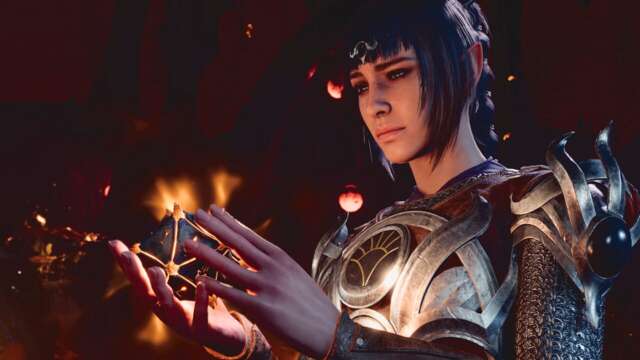
Baldur’s Gate 3 feels like an anomaly when it comes to AAA games. It’s built off of Dungeons & Dragons, it’s firmly rooted in the arguably antiquated computer RPG genre, and it’s a sequel to a game that came out 23 years ago. With one glance at the methodical turn-based combat and dense menus, some might say Baldur’s Gate 3 is a niche experience. But the response to Baldur’s Gate 3 over these last few months proves the opposite.
There’s been a hunger for a game like this for a while now, and Baldur’s Gate 3 over-delivers in nearly every sense of the word. Its rich and detailed world offers plenty of interesting set pieces and scenarios, the fantastic combat rewards experimentation and clever coordination, and its cast of characters is some of the best since Mass Effect.
As mentioned in GameSpot’s review, “Baldur’s Gate 3 pushes player freedom to its absolute limit.” Your actions have some wild consequences, and seeing how those decisions ripple five, 10, or 20 hours down the line is an absolute joy. When you add in the impressive voice acting and production value, Baldur’s Gate 3 feels like a once-in-a-lifetime experience, and one that’s best experienced on PC. — Jake Dekker
Cyberpunk 2077: Phantom Liberty

A lot was riding on Phantom Liberty, the one expansion that Cyberpunk 2077 would get. It was an opportunity for developer CD Projekt Red to make good on unfulfilled promises left from the original release, but what it did with Phantom Liberty goes beyond rehabilitating a reputation.
It’s a standalone story about the faults of loyalty, complicated relationships caught in a web of politics, and how the pressures of a gruesome and cynical world put people in precarious, life-or-death situations. It posits itself as a spy-thriller with espionage smartly woven into the personal drama of new and returning characters. Along with the poignant and intimate storytelling are some of the best action setpieces in Cyberpunk 2077–especially with the revamped skill trees and cyberware from the 2.0 update, Phantom Liberty brings the best out of its gameplay systems and a greater synergy between the way you build V and the battles you face.
Idris Elba has a commanding presence as key character Solomon Reed, but it’s the story of Songbird that makes Phantom Liberty emotionally impactful. Regardless of which route you first choose for the ending, you’ll be hit with some wild revelations you’d never see coming–and so, it’s imperative that you see both routes. Phantom Liberty is an incredible 25-30-hour ride and a complete experience on its own, but it even gives you a new ending for the original game; if you’d been on the Cyberpunk journey all this time, it hits hard. This expansion is an achievement not just for Cyberpunk 2077, but for games as a medium.
While it may be available on PS5 and Xbox Series X|S, the PC version in particular sets a new bar for how impressive games can be visually. Playing at a stable 60fps in 4K thanks to DLSS and throwing in some ray tracing, if you have the hardware, elevates the already-incredible experience. Phantom Liberty is one of those games where graphical fidelity genuinely adds to the experience, making the rough streets of Dogtown and the up-close and personal conversations all the more striking.
In the GameSpot review of Phantom Liberty, I gave it top marks with a score of 10 and concluded, “Beneath the violence and edginess, the actual cyberpunk world is always going to be about the toll on human life, and Phantom Liberty largely understands that. It’s cruel, sobering, and bittersweet, and it’ll stick with you well after V lays down their weapons.” — Michael Higham
Diablo IV
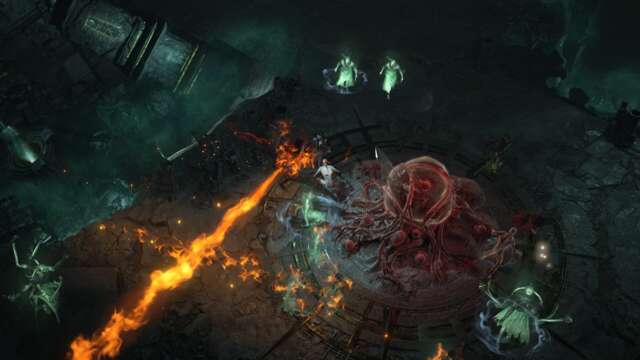
Diablo 4 had big shoes to fill. Although its predecessor launched in a state that was disappointing to many, Diablo 3 ended up in a great place, offering hundreds of hours of quality gameplay. With the latest game in the series, Blizzard looked to do something beyond simply releasing more Diablo, introducing an open world, MMO elements, and more to the tried-and-true Diablo formula.
It succeeds in many ways, notably including with its story, which is gripping throughout and features characters with some real depth to them–not necessarily things you associate with the loot-driven series. Also deep are the RPG systems themselves, offering compelling choices to make in how you build your character across the skill tree. Higher difficulties push you to thoroughly consider how you put your character together, with some surprisingly intricate boss fights that keep you on your toes. Subsequent seasonal releases have improved the game further since launch, making a variety of welcome changes, with more still to come.
Although we’re long past the days of Diablo’s PC exclusivity, a PC remains the best place to play Diablo 4. Beyond the impressive high-end visuals, which enhance the often disgusting and disturbing sights that await you throughout Sanctuary, a keyboard and mouse offers more precise control over your character and their abilities, letting you really push the highest-end challenges.
In GameSpot’s Diablo 4 review, Alessandro Barbosa wrote, “Diablo IV, at this time, cannot escape comparison to the past of the franchise it belongs to, but it’s thankfully a game that has been crafted with a strong awareness of what made each one either revered or reviled. It represents a measured approach to combining the many elements from previous entries that worked into a system that feels like the new standard-bearer for action role-playing. Coupled with a new benchmark for storytelling in the franchise, and a solid narrative foundation for any potential new adventures, it’s easy to see Diablo IV as something I’ll regularly check-in on for a long time to come.” — Chris Pereira
Pizza Tower
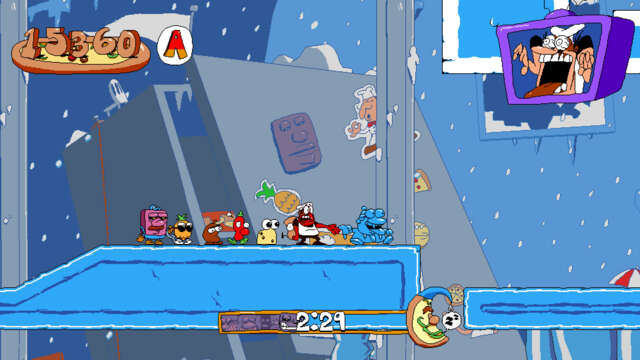
Peppino Spaghetti, dedicated small business owner, only wishes to save his beloved pizzeria. To do so, he must climb the nightmarish Pizza Tower, in a terrific platformer that uses only the freshest ingredients.
Pizza Tower is, at its heart, a love letter to the long-dormant Wario Land games, but with an unshackled speed and level of fluidity that puts you in a chaotic Sicilian flow-state as you master Peppino’s repertoire of platforming moves. It’s one of the best-feeling platformers you’ll ever play.
It’s also one of the most striking-looking games of the year. There’s an unrivaled energy to Pizza Tower thanks to its gorgeous animation, done in an MS Paint-inspired art style that invokes the expressiveness and ridiculousness of ’90s-era Nickelodeon cartoons if they were dumped in a vat of pizza sauce. Peppino himself is a nervous ball of anxiety whose expressions and vibes portray a complete wreck of a man, and it’s hard not to instantly fall in love with him.
Pizza Tower oozes with hot, bubbly charm, and features an intoxicating aroma that’s hard to resist. So bim bam boom, spin some dough, say hello to yo’ motha, and make ya self a pizza pie. Badda bing. — Jean-Luc Seipke
Puzzmo
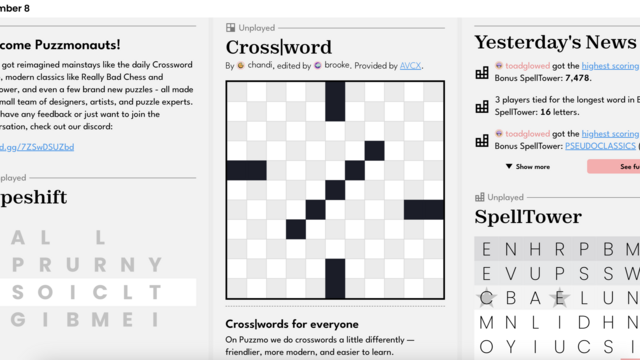
Newspaper games are classics for a reason. Zach Gage and his team have long recognized the love for daily bite-sized head scratchers, releasing apps reimagining favorites like Sudoku and chess, as well as their own compelling originals like SpellTower.
Puzzmo is a platform for newspaper games, offering a daily selection of number, word, and shape-based puzzles. Wordle paved the way for people sharing their puzzle success, and Puzzmo takes it one step further. Not only is Puzzmo a one-stop-shop to get access to a variety of puzzles, but also a place to connect with other puzzle fans, with leaderboards, stats, and even the ability to play against your friends. The website is clean and simple to use, and works beautifully on both desktop and mobile. It’s my new daily ritual, and it should be yours too. — Lucy James
Shadows of Doubt
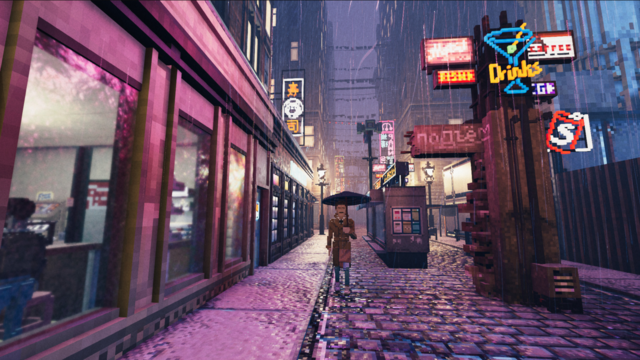
Few games give you the tools and freedom of being a detective quite the way Shadows of Doubt does. And even fewer allow you to shower in a suspect’s apartment while they’re asleep, eat the food in their fridge, collect fingerprints, and steal employment records before crawling back into the air duct through which you came. Shadows of Doubt is a procedurally generated immersive sim that puts you smack dab in the gumshoes of a detective in a fully functional and realized city, where no two players have the same city or experience, and it’s brilliant.
Similar to Minecraft, each player has its own generated world (or city, in this case), filled with residents who have their routines, jobs, relationships, and secrets. Buildings that can be explored in strenuous detail, fit with phone records, mail rooms, security systems, ventilation–and that’s barely scratching it. Each apartment has address books to look over, computers to hack, and letters to read, all of which are collected to untangle your evidence board to deduct your conclusions. It is, by all accounts, a detective’s playground. It allows for players to craft stories entirely on their own, on how they come to pin a suspect, and the process in which you shatter their alibis and place them at the scene of a crime.
Shadows of Doubt is in early access, but don’t let that deter you. Despite that, Shadows of Doubt feels like a fully realized product: an ambitious concept handled with an impressive clarity of style, and it’s among the most distinct games to come out on PC this year. — Kurt Indovina
Slay the Princess

“You’re on a path in the woods, and at the end of that path, is a cabin. And in the basement of that cabin is a princess. You’re here to slay her.” By the time you finish Slay the Princess, you’ll have heard this refrain at least half a dozen times. And yet, it never loses its intrigue and poeticism.
To call Slay the Princess a horror visual novel is entirely accurate, but fails to capture what makes it special–on top of being deeply psychological, it contains core themes of love and sacrifice and explores them in incredibly interesting ways. With each narrative loop and choice that sends your knight (and the varying voices in his head) through the game’s changing landscape, your understanding of the situation unfolding is altered. And you’re never quite sure if what you’ve gleaned is the game’s highest truth, or if the ending you’ve stumbled upon is the best way things could play out.
This disorientation is a joy to experience, and it’s made all the better by the game’s superb voice acting. With eldritch horrors, haunting spectres, macabre scenes, and dazzling romance, Slay the Princess is a unique adventure that twists the damsel-in-distress archetype on its head while still celebrating the idea of love. — Jessica Howard
System Shock Remake
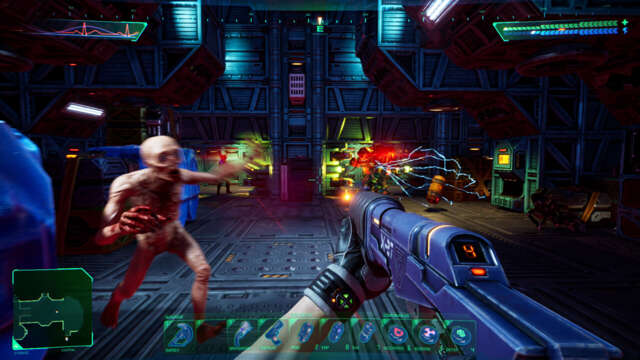
To talk about what makes the System Shock remake so great is to discuss what makes the original 1994 game so ahead of its time. It pioneered the use of audio logs as a storytelling device and is an often-forgotten early example of 3D metroidvania level design released only a few months after Super Metroid. It’s also responsible for the creation of one of the most iconic video game villains of all time, the malevolent SHODAN.
And yet, the original game is marred by an infamously cumbersome interface that, while not as bad as its reputation suggests, is undeniably a massive barrier that scares away many players.
For the remake, Nightdive does the obvious and reimagines the controls and interface to a more modern and intuitive style for players. And yet, critically, it kept everything that made the original system shock great almost entirely intact. The result is a game that can finally showcase the clever design and memorable story that it always had but was never able to be fully appreciated by a wider audience.
Thanks to its remake, we can point to System Shock, almost 20 years after its release, and recognize that it has always been an incredible game, rightfully deserving its place in video game history. — Jean-Luc Seipke
Your Only Move Is Hustle
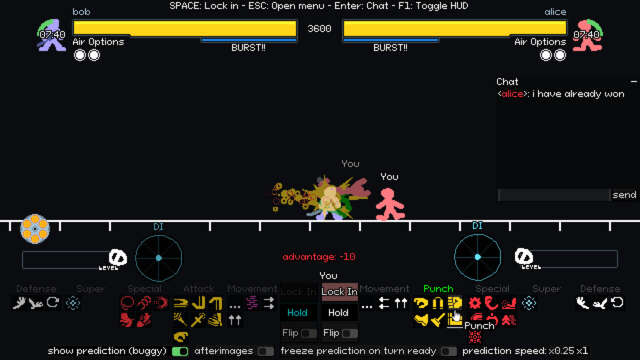
One of the best things about competitively playing video games is the intense, fiery feeling of facing off against another person. Fighting games offer one of the most intimate ways of enjoying this feeling. It’s all on you and your character doing your best to outplay someone else and their character. Every attack and counterplay is a split-second decision to match up against theirs. It’s always exciting to find new, promising fighting game experiences and more ways to experience that feeling. This year we got one of the most interesting fighting games to come along in a while, Your Only Move Is Hustle.
Your Only Move Is Hustle or Yomi Hustle, a fighting game made by one person, might be your and your fighting game friends’ new obsession if this is your first time hearing about it. It’s not a traditional fighting game, but you better believe knowing your frame data and coming up with a solid plan of attack are critical. Yomi Hustle is a turn-based fighting game that removes the barrier of execution that may be difficult for some people to get over but still allows for amazing depth of strategy and player expression. But the best part of every match has to be the end, when the game takes all those turns and plays the fight out in real-time, looking like something straight out of your favorite anime or Newgrounds-style stick-figure fighting animation. The excellent modding community for Yomi Hustle further enhances it: Hundreds of wildly creative and cleverly designed characters, stages, and more can all be easily added to the game through Steam’s workshop to expand your experience. — Ben Janca




